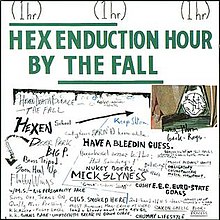Hex Enduction Hour
| Hex Enduction Hour | ||||
|---|---|---|---|---|
 |
||||
| Studio album by The Fall | ||||
| Released | 8 March 1982 | |||
| Recorded | 1981 at Regal Cinema, Hitchin, England; August 1981 at Hljóðriti, Reykjavík, Iceland | |||
| Genre | Post-punk | |||
| Length | 60:08 | |||
| Label | Kamera | |||
| Producer | Grant Showbiz, Richard Mazda, Mark E. Smith | |||
| The Fall chronology | ||||
|
||||
| Professional ratings | |
|---|---|
| Review scores | |
| Source | Rating |
| AllMusic | |
| Pitchfork | 9.6/10 |
| PopMatters | 9/10 |
| The Quietus | very favourable |
| Record Collector | |
| Stylus Magazine | A |
Hex Enduction Hour is the fourth studio album by the English post-punk band the Fall. Released on 8 March 1982, it builds on the low-fidelity production values and caustic lyrical content of their earlier recordings. Fall frontman Mark E. Smith establishes an abrasive Northern aesthetic built in part from the 20th century literary traditions of kitchen sink and magic realism. Smith described it as an often satirical, but deliberate reaction to the contemporary music scene; a stand against "bland bastards like Elvis Costello and Spandau Ballet ... [and] all that shit."
Recording began during a 1981 three concert visit of Iceland, when Smith was inspired both by the otherworldliness of the landscape, its history and the enthusiasm of an audience unused to visiting rock groups. The Fall recorded "Hip Priest", "Iceland" and non-album single "Look, Know" at the Hljóðriti studio in Reykjavík, and the remaining tracks in a disused cinema in Hitchin, Hertfordshire on their return to England. The album was widely praised on release as fully capturing their aggressive live sound. The UK recordings and later promotion were funded by the independent record label Kamera following a bitter and protracted dispute between Smith and former label Rough Trade Records. Hex Enduction Hour was well received by critics, and sold well relative to its release on a small label, and earned The Fall their first UK Albums Chart placing at No. 71. Today it is considered a hallmark of the post-punk era.
By 1981 the Fall had released three critically acclaimed albums, but band leader Mark E Smith felt they were undervalued and poorly supported by their label Rough Trade Records, whom he regarded as "a bunch of well meaning but inept hippies". He felt constrained by the label's ethos and worried that the Fall were in danger of becoming "just another Rough Trade band". Smith made overtures to other labels, and found kindred adventurous spirits at small emergent label Kamera Records. Kamera's first release in November 1981 was The Fall's single "Lie Dream of a Casino Soul", which also featured drummer Karl Burns for the first time since Live at the Witch Trials. Burns previously substituted for Paul Hanley on the US tour when the latter was denied a visa for being too young, and upon the group's return to the UK, Smith suggested that Burns should stay on as a second drummer.
...
Wikipedia
